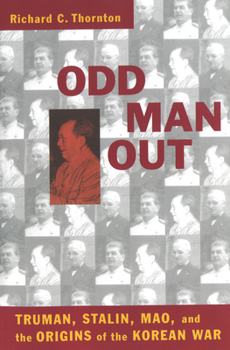Odd Man Out: Truman, Stalin, Mao, and the Origins of the Korean War
Select Format
Select Condition 
Book Overview
Odd Man Out is a novel assessment of the motives and strategies of Harry Truman, Joseph Stalin, and Mao Zedong as they struggled to maneuver their countries into positions of advantage in the postwar world. Their successes and failures resulted in the catastrophic event that globalized the Cold War ---the Korean War. Based on recently released secret documents, Richard Thornton puts the reader inside the American, Soviet and Chinese decision-making...
Format:Paperback
Language:English
ISBN:1574883437
ISBN13:9781574883435
Release Date:August 2001
Publisher:Potomac Books
Length:384 Pages
Weight:3.65 lbs.
Dimensions:1.2" x 6.3" x 9.2"
Customer Reviews
2 ratings
very good book
Published by Thriftbooks.com User , 20 years ago
this book explains everything. It explains why US was ignoring the north korea preparation for invasion. It also explains why Mao start to go against Soviet after the Korean war,because he was fooled by Stalin like an idiot.
A Fundamentally New View of the Korean War
Published by Thriftbooks.com User , 24 years ago
The conventional interpretation of the Korean War is that Kim Il Sung provoked the war, and forced a reluctant Stalin to support him, and that the United States was surprised both by the North Korean offensive of June 1950 and by the subsequent Chinese offensive of November 1950. In this important new book, Thornton offers a compelling argument for a re-examination of this version of events. Thornton begins with a logical examination of the geopolitical interests of the principal actors: the USSR, the PRC, the USA, and North and South Korea. He shows that Mao wanted good relations "with all nations" - including the US - but needed Soviet assistance to seize Taiwan. Stalin, however, regarded a Sino-American rapprochement as his worst nightmare, and responded by unleashing North Korea against South Korea. Stalin calculated that this move would inevitably bring the US and China into conflict, and thus forestall his nightmare scenario. (In his discussion of Mao and Stalin, Thornton builds on such works as Goncharov and Lewis's "Uncertain Partners".) The US, for its part, wanted to keep Russia and China apart, and in late 1949 began backing away from support from Taiwan, which was of course the main obstacle to good US relations with the PRC. This policy was subsequently re-evaluated when Washington understood that the Soviets and the Chinese had reached an understanding of their own.Thornton demonstrates that Stalin was the principal instigator of the Korean War, not Kim Il Sung - the tail did not wag the dog. The Soviets planned the June offensive, and supplied the North Korean Army with the weapons without which no attack could take place. Moreover, the Soviets controlled the timing, pace, and outcome of the North Korean offensive through their control of crucial resources: communications equipment, bridging equipment, anti-aircraft weapons, food, fuel, and ammunition. Without these resources, the North Korean offensive could NOT succeed, a fact that certain so-called experts in the field of logistics have utterly failed to understand.Thornton shows that the development of NSC-68 tracks precisely with the evolution of the Sino-Soviet alliance and the Soviet decision for war in Korea. He argues that Truman deliberately left South Korea vulnerable to invasion (a "tethered goat") in order to invite the war that would cement public, political, and congressional support for the new strategy of containment. Thornton shows that the United States was aware of the Soviet arms buildup in North Korea and of North Korean intentions. Therefore, US action (and inaction) in response to this ample intelligence lead inexorably to the conclusion that the US did not wish to deter attack, but to entice it. Similarly, Thornton shows that Truman was not surprised by the Chinese attack in late 1950, but decided to accept war with China with a full understanding of the consequences. These consequences were, in Thornton's view, ultimately beneficial to the United States; C





